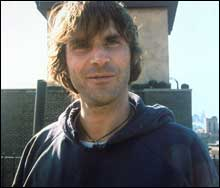 You’re on a subway in an unfamiliar city, and you don’t know how you got there or where you’re going. Not only are you unable to remember where you were an hour ago, or last week; you don’t even know your name and address. What do you do? Probably panic, then seek help — as Douglas Bruce did when this happened to him in July 2003. Your next step? I don’t know about you, but I might go with Bruce there, too: make a movie about it. Unknown White Male (which opens on March 24 at the Kendall Square Cinema), directed by Rupert Murray, Bruce’s long-time friend, is the documentary of how Bruce coped with his memory loss.
You’re on a subway in an unfamiliar city, and you don’t know how you got there or where you’re going. Not only are you unable to remember where you were an hour ago, or last week; you don’t even know your name and address. What do you do? Probably panic, then seek help — as Douglas Bruce did when this happened to him in July 2003. Your next step? I don’t know about you, but I might go with Bruce there, too: make a movie about it. Unknown White Male (which opens on March 24 at the Kendall Square Cinema), directed by Rupert Murray, Bruce’s long-time friend, is the documentary of how Bruce coped with his memory loss.
Memory and its vicissitudes have offered rich material for films. We need go no further back than to such recent hits as Memento and Eternal Sunshine of the Spotless Mind. Those with longer recall could add to the list Alfred Hitchcock’s Spellbound and Edward Dmytryk’s Mirage, in each of which Gregory Peck plays a man who loses his memory and thinks he may have been involved in a crime.
Peck’s trademark as an actor was his self-evident honesty. If he told you he had amnesia, you believed him. For Douglas Bruce, getting film audiences to buy his story has proved more of a problem. Since the film’s premiere at Sundance in 2005, the suspicion that Bruce’s amnesia is a hoax has made the rounds. GQ reported that Eternal Sunshine director Michel Gondry, after meeting Bruce, “didn’t believe” his story. Two aspects of Bruce’s story that have raised eyebrows are the rarity of his case — a complete blackout over the three decades of his life before his amnesia — and the failure of doctors to find clear evidence of any precipitating trauma. (Not to mention the fact that some people are feeling burned by the recent James Frey/J.T. LeRoy revelations.)
How does filmmaker Rupert Murray answer those who doubt his friend’s amnesia (from which Bruce has still not recovered)? “I feel sorry for them that they question the credibility of the film, instead of being inspired by the deep philosophical questions the film raises about self, identity, and the past. I could have filled the film with endless testimony from all of his doctors, but I didn’t. The idea that it was a hoax never came up. It’s something that they would have mentioned.”
Another reason why Unknown White Male might make bullshit detectors quiver is that Bruce, who is rich, glib-tongued, and good-looking, appears to have experienced — to judge from the film — neither great difficulty in forging a fulfilling new life nor many regrets about abandoning his old one. Murray admits, “We can’t escape the fact that he, and I, are very fortunate to come from a privileged background. But what I think was most important about how he coped with his amnesia is not so much that he had money, but that he had no dependents. He was a student. That gave him enormous freedom in choosing what elements of his former life to retain, and what to discard.”